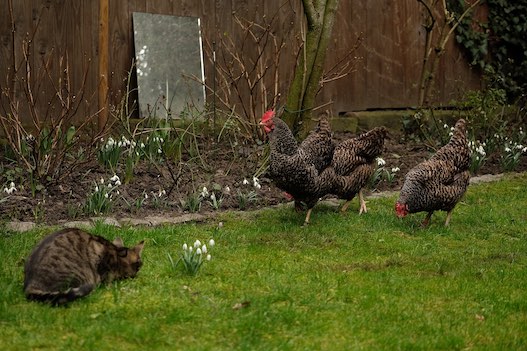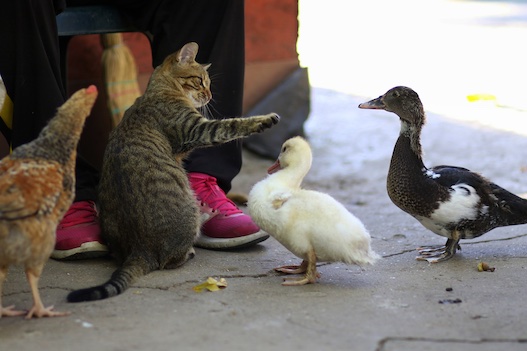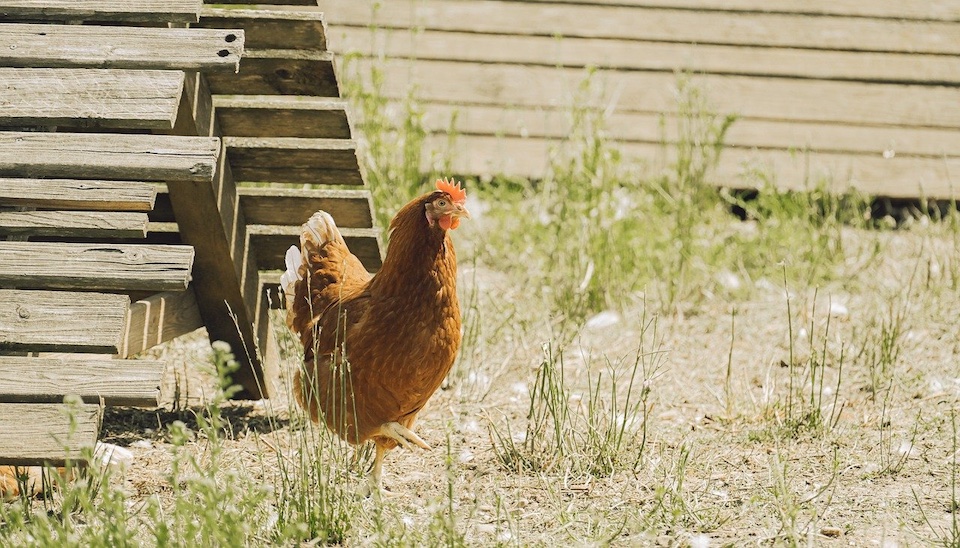Are cats a threat to chickens?
Are cats a threat to chickens?
If you were to create a list of chicken predators, cats would not be at the top of the list. While cats certainly can be a threat to other birds, cats will rarely attack a fully grown chook. Small chicks, on the other hand, could easily be injured by a cat.
Our property joins our neighbour's property without a physical fence boundary. Instead, we have plants and shrubs. Our neighbour has eight chooks, which freely come and go throughout the yard whenever they feel like it. As for our cat, she can sit there all day just watching from a distance, daydreaming and wondering what the chooks are all talking about.

Key Takeaways
- Cats are unlikely to attack adult chickens, but they are a real threat to chicks and pullets (young birds)
- Keeping both cats and chickens has the benefit of keeping rodents and wild birds away from the chicken coop
- When introducing a cat to chickens, start with a mesh fence between them and supervise interactions until you are confident that they will get along
- A chicken attacked by a cat needs veterinary care to prevent deadly infection, even if no injuries are visible
Are cats a threat to chickens?
Cats are not generally a threat to chickens for a few reasons:
- A fully-grown hen is too big to be typical prey for a cat
- Chickens are usually in flocks, while cats are solitary hunters, so cats will be outnumbered easily if they do go after a chicken
- Chickens, and especially roosters, are capable of defending themselves from most cats
- Well-fed cats only hunt for fun, so are unlikely to attempt something desperate
That said, a starving feral cat or a really big cat like a Maine Coon or Norwegian Forest Cat might look twice at a chicken, particularly a hen that has become isolated from the rest of the flock. Cats are usually solitary hunters, but if you do have cats that hunt or play together, they could also pose a higher risk.
But plenty of urban chicken keepers have bantams in areas where stray cats and their neighbours' pets roam the neighbourhood hunting, and we've never heard of a cat attack on a fully-grown chicken, even a small one!
Are cats a threat to pullets or young chicks
Until they are fully-grown, pullets and chicks are absolutely at risk from cats. Even your sweet old house cat will hunt a chick if it has a chance, unless it has been trained not to. And chicks don't have the skills to protect themselves the way grown hens do!
Always keep chicks and pullets in a safe enclosure protected from cats and other predators, or under the watchful eye of a mother hen.
Benefits of cats and chickens together
We want to set the record straight on behalf of all the cats out there with a bad reputation for something they have not done. Cats and chickens have lived together happily for hundreds of years! In fact, a barn cat was as much a feature of old time farms and homesteads as barnyard chickens and poultry were!
There are some mutually shared benefits for cats and chooks becoming mates:
- Having a cat around will help catch mice or rodents who are after feed on the ground. In turn, fewer mice and rats about mean less invitation for snakes which feed on rodents. If your chooks are in an enclosed pen or coop, you can stop feed on the ground by using a Dine a Chook Waste Reducing Chicken Feeder.
- Cats may be a deterrent to wild birds. Wild birds can bring disease, such as Avian Influenza, mites and lice to your flock. So to have a cat as a deterrent is a great benefit for all. The cat enjoys scaring away the birds; the chickens are less likely to develop sickness. Win, Win.
- Cats and chickens can be great friends. Yes, it's true. There are plenty of chickens and cats that play with each other and enjoy each other's company!
How to keep cats and chickens together
Cats and chickens will often develop their own rapport if left to their own devices. They don't often choose to interact, although it certainly happens.
In most backyards, the chickens will go about their business foraging, while the cat will sunbathe and prowl, both being mindful of each other's space. However, we do have friends with a cat that chases the chickens; it never catches them, and we don't think it is really trying to, and the chickens just run a little ways before shaking out their feathers and going back to their business.
Usually, your cat will watch the chickens carefully before deciding that they are too big to consider food. After that, your cat will likely leave the chickens to their own devices, or perhaps enjoy watching them in the garden. Your chickens will also become used to the cat and stop seeing it as a threat, although they may remain wary of strange cats in the yard.
You should be particularly careful with pullets and chicks. Our advice, don't even trust a cat that has been absolutely fine with adult chickens. It is not worth the risk! Your cat may see chicks as prey and can easily kill a chicken even if it was just playing with it!
Introducing a cat to chickens
The easiest way to keep cats and chickens together is to introduce your cat to chickens and chicks when it is still a kitten. Cats brought up like this will often be very friendly to chickens, and are unlikely to harm chicks. However, do observe your cat and chickens carefully in the beginning to ensure nothing goes awry.

In terms of adult cats, some cats are more likely to pose a threat to chickens than others. If you have a real hunter, it may be necessary to train your cat to leave chickens alone. On the other hand, a less active cat may show no interest in the chooks at all!
Regardless of its personality, we recommend watching your cat carefully the first time it is introduced to chickens. It is important that you are out in the yard to intervene, just in case your cat decides to chase, play with or attack a chicken. If your cat does do something like this, stop it immediately and reprimand it! Also make note of your cats behaviour towards the chickens and whether you might need to provide supervision for the next few encounters as well, just in case!
If you are worried about your cat meeting your chickens, follow these simple steps to train your cat and chickens!
- Start by introducing your cat and chickens through a fence. Wire mesh is the best option, as your cat and chickens will be able to see and smell one another. This gives both your cat and the chickens a chance to get used to one another before they are let out together.
Take note of both your cats' and your chickens' behaviour. If your cat seems aggressive, scared or predatory, talk to it, pat it and provide treats. Repeat this step until your cat can see the chickens and remain calm. If your chickens are aggressive or distressed, distract them with treats. Again, don't move on to the next step if your chickens are still trying to attack the cat through the fence.
We will also sometimes introduce our cat to a chicken with one of us holding the cat and one of us holding the chicken. However, this is only possible if your cat and chicken are calm and relaxed, as you don't want the chicken to peck the cat, or the cat to claw you trying to get away!
- Once your chickens and cat can see one another calmly, you can try introducing them to one another in an open, supervised area. Usually, it is best to bring your cat outside while the chickens are foraging normally. Allow your cat to watch from a distance, observing its behaviour and being ready to intervene if necessary. Keep treats on hand to call your cat if needed, and make sure your cat knows you have them! If there is an incident, go back to the previous step.
- If the first meeting goes well, allow your cat and chickens to encounter each other for longer periods, first supervised and then for short unsupervised periods. If all goes well, you will know your cat and chickens can live together in harmony!
Do be careful of creating a situation where your cat could corner a chicken, for example letting the cat go into the chicken coop. Chickens are likely to be able to escape or fight off a cat as a group in an open space, but if a single bird is cornered by a cat, it is much more at risk.
What should I do if my chicken is attacked by a cat?
You are very unlikely to ever need this information, but if your chicken or chick is attacked by a cat, you must seek veterinary attention.
Even if the chicken seems fine, the cat will have left tiny punctures in the chicken's skin, under the feathers where they are almost impossible to see. Because of the bacteria that a cat carries in its claws and mouth, these tiny punctures will become infected and can cause the death of your chicken without veterinary care. The vet will usually prescribe your chicken with antibiotics to prevent infection from developing.
Happy chicken keeping!
Justin at Dine a Chook Australia



